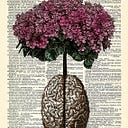Member-only story
Buried Meanings
Heidegger, tradition, and poetry
Today’s article will explore a quote from Martin Heidegger’s Being and Time that begins as follows:
“When tradition becomes master …”
To orient ourselves, let’s work with a concrete example of tradition: the Arabic word ti2burne.
But first — how can we examine tradition by way of a single word? Aren’t traditions more complex, more substantial than that?
In fact, in a single word we find many elements of tradition: a word, we might say, is a ‘micro-tradition’. It consists, after all, of a practice of pointing something out, and this practice is something that we learn from tradition through the process of socialization.
So then, what does it mean for a tradition, and by extension for a word, to become master? Heidegger continues:
“… it does so in such a way that what it ‘transmits’ is made so inaccessible, proximally and for the most part, that it rather becomes concealed. …”
What is it that the word ti2burne ‘transmits’? Like any other word, it transmits its meaning. And the meaning, when translated idiomatically into English, is something like ‘how precious’: it’s said when we see something greatly beloved, whether a romantic partner or a cherished family pet.
